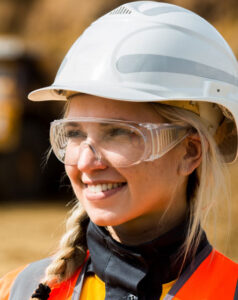How Improved PPE Impacts Construction Safety for Women
 We all know construction comes with risks and women are as fit as anyone to handle the hazards — but it shouldn’t be more challenging. From the physical demands of heavy lifting to the risk of falls, construction sites can be volatile environments. Over the years, women have encountered added safety challenges on job sites because personal protective equipment (PPE) didn’t fit female employees correctly. It wasn’t until 1999 that OSHA proposed recommendations to provide equal safety and health protections for all industry professionals.
We all know construction comes with risks and women are as fit as anyone to handle the hazards — but it shouldn’t be more challenging. From the physical demands of heavy lifting to the risk of falls, construction sites can be volatile environments. Over the years, women have encountered added safety challenges on job sites because personal protective equipment (PPE) didn’t fit female employees correctly. It wasn’t until 1999 that OSHA proposed recommendations to provide equal safety and health protections for all industry professionals.
Improvements in PPE have been making a significant positive influence on how well women fit into their gear. As the number of women in construction grows, it’s increasingly important to understand how PPE impacts construction’s female workforce.
The Effects of Poor PPE
When women began to enter craft professions during World War II, they quickly realized the gear they needed to wear wasn’t adequate — males dominated trade positions and the only PPE available was designed for men. For decades, women wore oversized coveralls and massive glasses sized to fit larger body frames that negatively impacted their work and created safety hazards for women and job sites.
Without wearing the correct PPE, craft professionals put themselves at risk. Oversized garments fit awkwardly and uncomfortably, hard hats that don’t fit properly can fall off or be a distraction, ill-fitted footwear can cause blisters and tripping hazards, and eyewear is only protective if it’s tightly secured on the face.
PPE in the Modern Era
Now that more than 1.17 million women work in the construction industry, PPE designed for women is an essential offering and companies have been noticing. Over the past 20 years, many organizations have made it a point to advocate for appropriate safety gear for female construction workers.
Today, manufacturers acknowledge the importance of making apparel to better fit women. As such, they’ve started to make PPE specifically designed to accommodate a range of body types and sizes. Because of the wide selection of fit available, female employees have greater opportunity to find comfortable and appropriate PPE. These options include redesigned eye, face, head and hand protection, and footwear — all of which are necessary to maintain a safe and productive work environment. Newer PPE even comes in several designs and colors, bridging a demand for both functionality and fashion.
The Future of PPE
The International Safety Equipment Association, in coordination with OSHA, wants to pave a new path for PPE. The goal is to make it more universal and accessible.
Currently, there are several types of PPE made for women in the construction industry. But there’s still room for improvement. Manufacturers, along with business owners, have an opportunity to accommodate the growing number of women in the field and to prioritize their safety through PPE.
All Workers Need Personal Protection
What used to be a male-dominated workforce now employs more women each year. And as more women join the industry, the need for appropriate PPE for all craft professionals is not only a matter of equality, but safety.
Significant advancements have been made to make PPE more accessible for women, while also making the construction industry a welcoming option for all. NCCER’s women in construction research series, In Her Own Words, highlights the importance of a female workforce in the skilled crafts and the actions contractors can take to build more inclusive projects and companies.
Learn more about NCCER’s commitment to women in the construction industry.

